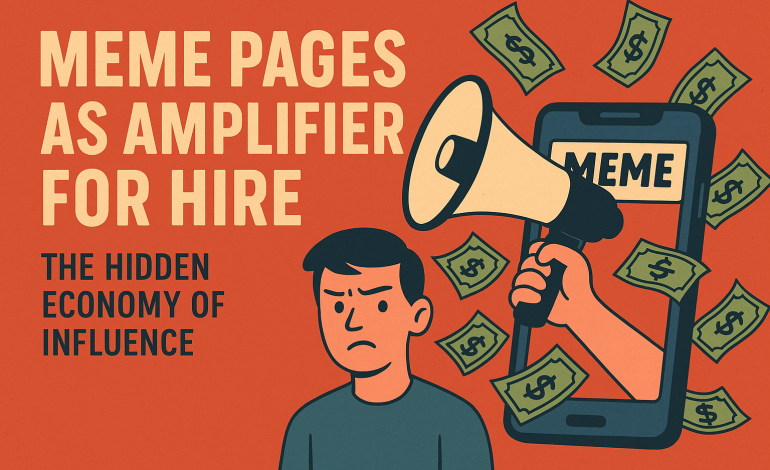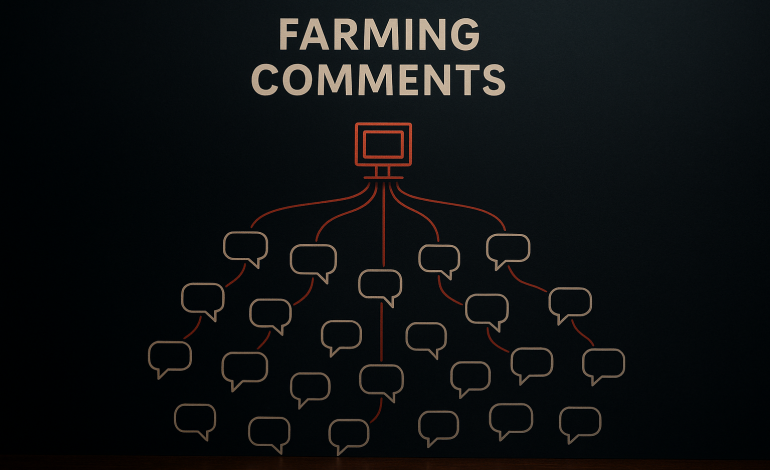
On the surface, meme pages in Sri Lanka feel harmless. They make us laugh, give us something to share with friends, and capture daily life with a mix of wit and sarcasm. But behind that humor, something far more complex is unfolding.
Over the past few years, many meme pages have quietly shifted from being just spaces of entertainment to becoming powerful amplifiers. What started as inside jokes and cultural references has now turned into an ecosystem where a well-timed meme can shape public conversations, influence perceptions, and in some cases, push hidden agendas.
The Rise of a New Digital Tribe
Meme pages have become a digital community of their own. They are fast, funny, and speak the language of young people. They capture everyday frustrations, local slang, and political humor in ways that feel familiar and safe.
But it’s that very familiarity that gives them power. People tend to lower their guard when information comes wrapped in humor. A meme doesn’t feel like a news report or an advertisement. It feels like a joke. And because it feels like a joke, we rarely stop to ask where it came from, who’s behind it, and why it was posted in the first place.
When a Joke is Not Just a Joke
A growing number of meme pages in Sri Lanka are quietly being paid to share content that aligns with someone else’s agenda. Sometimes it’s a political group looking to mock an opponent. Sometimes it’s a business trying to undermine a competitor. And sometimes it’s a lobby or interest group trying to push a cultural or ideological narrative.
The amounts are not large. A few thousand rupees can buy a meme and a share. A little more can buy coordinated posting across multiple pages. In a few hours, a story that no one was talking about in the morning can become the country’s punchline by night.
Most followers have no idea they’re consuming paid content. It doesn’t look like an ad. It doesn’t have a “sponsored” label. It looks like a random meme. But it isn’t.
The Ripple Effect
What seems like small, individual posts can have large consequences. Misinformation spreads faster than fact-checked reporting. Satire blurs into rumor. Public opinion shifts subtly but powerfully. And those who share or like the meme may never realize they’re participating in someone else’s strategy.
In this kind of environment, creators are not just entertainers. They become accidental messengers. Some know exactly what they’re doing. Others genuinely believe it’s just “content.”
A Responsibility on Both Sides
This is not just a creator problem. It’s also an audience problem. Every time we share something without questioning it, we give it more reach. Every time we laugh without context, we normalize it.
For creators, there’s a deeper responsibility now. Humor travels fast. A careless post can ripple through thousands of minds. Before sharing, it’s worth asking: Who benefits from this? What’s the larger story behind it? Is it worth trading credibility for a quick payment?
For audiences, the responsibility is to look beyond the joke. Not every meme is innocent. Some are carefully planted seeds meant to grow into narratives.
Humor with a Conscience
Meme pages are an important part of Sri Lanka’s online culture. They bring people together, reflect our shared experiences, and give a local voice to the digital space. But humor without conscience can easily become a weapon in someone else’s hands.
The truth is, every meme carries a message. Every message has a sender. And not every sender is honest about their intentions.
Meme creators have the power to shape how we see the world. And with power comes responsibility — even if it’s wrapped in a punchline.In Sri Lanka, many meme pages have quietly evolved from hobby spaces into informal influencer networks. What was once community-driven humor has become part of a growing underground economy built on paid content amplification.
For a few thousand rupees, some meme admins are willing to share almost anything. They will push topics without verifying authenticity, amplify controversies to create noise, promote political, commercial or ideological agendas, and coordinate with other pages to make something trend overnight.
What makes this particularly dangerous is that most followers have no idea they are consuming paid or manipulated content. It appears to be humor or harmless sarcasm, but beneath the surface, it is often a calculated move.
The Psychological Power of “Funny” Messaging
When information is wrapped in humor, something subtle happens. People lower their critical thinking defenses. They are more likely to remember the message. They rarely stop to ask, “Who benefits from this?”
This psychological blind spot is what makes meme-based propaganda so powerful. It doesn’t have to look like an ad or a political campaign. It only has to feel funny or relatable.
Who’s Behind the Curtain
Across Sri Lanka, different interest groups are quietly using meme pages to seed narratives. Political groups pay to ridicule opponents or glorify their leaders. Corporates and startups pay to undermine competitors or subtly promote their own products. Lobby groups and influencers pay to push moral, cultural or ideological ideas that align with their interests.
These deals often happen informally, through private messages and small cash transfers. Many page owners do not fully understand the long-term consequences of the content they amplify. Some do, but choose to look away.
The Ripple Effect
When meme pages promote agendas purely for payment, the damage spreads fast. Misinformation outruns credible reporting. People are manipulated without realizing it. Social divisions grow deeper as humor turns into a weapon.
The credibility of genuine meme communities begins to erode, and creators themselves can unknowingly become part of larger political or commercial influence operations. Even something that seems like a harmless meme can shift public perception, especially during sensitive moments such as elections or national debates.
Why Ethics Matter More Than Ever
The absence of clear rules and the lack of transparency make it crucial for both creators and audiences to act responsibly.
For creators, the responsibility is to think before posting. Don’t share content you don’t understand just for a quick payout. Ask who benefits from the narrative. Be transparent when content is sponsored. Understand that what seems like a single post can create ripple effects across thousands of people.
For audiences, the responsibility is to question why something is suddenly trending. Ask why multiple pages are posting the same thing at the same time. Demand transparency. Support the creators who stay independent.
Meme Pages Are Not Just “Jokes”
In today’s digital world, memes have become powerful soft tools of influence. When creators share content without understanding its origins, they can unknowingly become foot soldiers for someone else’s strategy.
Sri Lanka is still developing its digital literacy culture. This makes the role of meme admins and influencers even more important. Humor is powerful, but when humor is for sale, truth becomes collateral damage.
Final Thought
Every meme is a message. Every message has a sender. And not every sender is a friend.
Meme pages can be cultural voices that reflect who we are. But without ethics, they can easily become echo chambers that serve hidden agendas. It’s not just about sharing a post. It’s about understanding the power behind what is being shared, why it’s being shared, and who gains from it.




